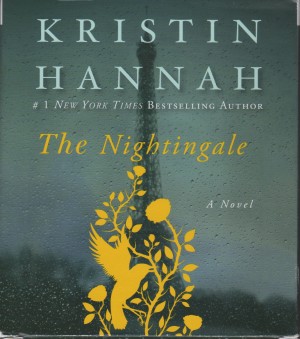
The Nightingale by Kristin Hannah (2015. St. Martin’s Press/MacMillan Audio. ISBN 9781427212672)
I am deadly serious. By the time I was on the final disc of this terrific audio novel, I was crying so hard, I had a difficult time keeping my blue Pacifica on I94 coming back from a ski trip to Montana. This is a deeply loving, touching, tragic, and heroic story that, well, is just too damn emotional to listen to while trying to drive.
Stripped to the barest of plot essence, this novel is the story of two sisters, the staid, married, stable Vianne (Vee-en) and her younger, impetuous, beautiful sibling, Isabelle (Iso-bell) during the Nazi invasion of France during WW II. Both girls have grown to womanhood without the loving touch of their mother. Their father, Julian, slipped into a coma of alcohol and despondency after the death of their mother, and, in hopes of curbing Isabelle’s emotional instability, sent her off to a series of convents, boarding schools, and finishing schools, all of which she ran from in search of freedom and her own path. By the dawn of the story arc, Isabelle has run again: this time, to join the French Resistance (the partisans) in Paris, where she falls in love with Gaton, a lanky, brooding, older compatriot who takes her under his protection and teaches her the rules of insurgency. Vianne’s husband leaves for the war, is captured when France falls swiftly to the Nazi onslaught, while Vianne remains behind on her father’s farm, raising her daughter. The title of the story comes from the code name the Germans give to Isabelle’s clandestine efforts, through a partisan network she forms, to save downed Allied airmen: Brits, and Yanks, and Canadians, who she escorts time and again across the Pyrenees Mountains into Spain and to freedom. Vianne is left to contend with the subtle danger of having German officers billet in her home. First, a well-mannered Wehrmacht (German Army) officer moves in and serves as her protector against the mounting brutality of the occupation. The army officer is replaced by an SS officer who, in stereotypical cruelty, degrades, abuses, and dismisses Vianne all the while denying that the Allies are making headway towards the liberation of France. With each concealed Allied triumph, Vianne faces greater and greater demands upon her mind and body from the SS officer, demands that make her question whether she or her younger sister has made the wiser choice in dealing with the Nazi occupation. But Vianne too has a secret, a secret that, while not as complex or involved as the work Isabelle is engaged in, places Vianne and her daughter in the gravest of danger as well.
I’ve never read anything by Ms. Hannah but as a reader who loves lush, character driven, historical fiction, I was sincerely impressed with not only the details of the dual lives Ms Hannah created in telling this dynamic tale of familial love, but also the depths of character and plot that she wove together in a seamless cloth of believability. There is nothing that rings false in this novel. No dissonant chords are struck over the 17 hours of audio (unabridged) that make up this fine, fine piece of work.
What is also striking is that, having not compared notes with Ms. Hannah before writing my own story of war and the Holocaust, Sukulaiset: The Kindred, there are many, many parallels between the two novels: Sisters seeking reunion against a backdrop of conflict; traumatic assaults on fleeing civilians by enemy aircraft; depictions of inexplicable cruelty by conquering forces; and the like. Both novels have scenes drawn from the horrific confusion and abuse heaped upon the civilians of Europe during WW II. And yet, the books are, in the end, different stories told in different styles, each worthy of a read in their own way.
This is one of my favorite novels of the past decade. I can’t express enough my support of the concisely drawn plot, the historically accurate detail, and the wonderfully complex characters that the author has gifted us with. A stellar read.
5 stars out of 5.


